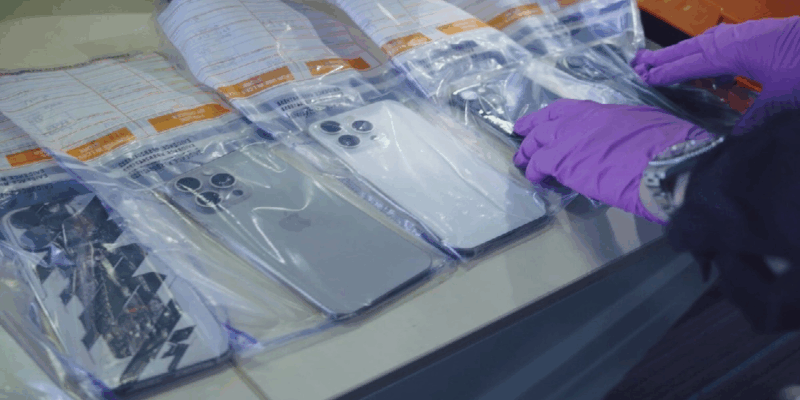A major phone theft network operating in London has been dismantled, resulting in the arrest of 46 suspects involved in the theft and smuggling of approximately 40,000 mobile phones. Police have described this operation as the largest crackdown on mobile theft in the UK.
This network was responsible for nearly 40% of phone thefts in London, which included incidents such as street muggings, courier robberies, resale shops, and international smuggling.
A probe was launched last year after 1,000 iPhones bound for Hong Kong were seized near Heathrow. The iPhone-targeting crime ring exploited the high resale value of the phone, buying them for £300 and reselling them in China for up to $5,000. Police called the gang a supply chain of thieves, handlers, and buyers.

In a coordinated raid targeting gangs hijacking delivery vans of the new iPhone 17, police arrested eleven suspected gang members. Two men were also detained for alleged money laundering, and £40,000 in cash was seized.
Sources indicate the network used encrypted messaging to plan thefts and concealed financial transactions through small payments and fictitious accounts.
From stolen phones to international smuggling
The operation exposed the ease with which stolen phones travel from local thieves to international markets. Sourced from street and courier robberies, as well as resale shops, the phones were routed through warehouses and repair shops to obscure their origins. Typically labelled as “used goods” or “refurbished electronics” to evade suspicion, the devices were primarily destined for China, where Western brands are highly sought after.
Police report enormous profits from the operation, with criminals earning thousands of pounds per shipment by transforming minor thefts into a lucrative international business. While the arrests are a significant step in disrupting the network, authorities emphasise that ongoing international cooperation is crucial to dismantling the entire operation.
The issue extends beyond the UK. In Nigeria, where no official Apple stores exist and devices are sold through independent retailers, authenticating products is difficult. Recently, Pastor Gbenga Wemimo’s attempt to trade in an iPhone purchased in Lagos at a London Apple Store failed when attendants, despite presented receipts, flagged it as stolen.
This incident has fueled debate regarding the legitimacy of Nigerian Apple retailers and the wider issue of verifying expensive electronics.


Read also: Social media roundup: Fake iPhone, 2Baba in the news, NCC asks Nigerians to pirate? etc
Social media users echoed these points, noting that phones bought abroad and imported into Nigeria could be resold and falsely reported as stolen elsewhere. Others added that similar incidents in the UK demonstrate that misrepresented or stolen devices are a global, not just local, issue.
Implications for the mobile phone industry and consumers
The Lagos affair and London raid highlight threats to users of mobile phones, high-end electronics, and international trade. Lucrative Chinese resale prices fuel organised crime through smuggling, while consumers worldwide struggle to authenticate devices.
In 2024, the Nigerian Communications Commission (NCC) introduced the Device Management System, featuring a Central Equipment Identity Register to monitor mobile devices on networks. This system, which requires mobile network operators to connect devices, aims to deter the sale of stolen phones and enhance industry security through phone registration at the point of sale, according to experts.
In Q2 2025, Apple was the third most impersonated brand in phishing attacks worldwide, following Microsoft and Google. Scammers frequently mimic well-known brands to steal sensitive information like passwords and credit card details. As demonstrated by the smuggling case, stolen phones can facilitate fraud internationally.
Consumers should be vigilant by enabling device tracking, recording serial numbers, and immediately reporting thefts. Verify the origin of purchases, especially for high-value electronics.


This case underscores the scale and sophistication of modern phone theft, where criminal enterprises operate as complex supply chains involving thieves, logistics, and international buyers. To combat this, police, customs, manufacturers, and international partners must collaborate to protect consumers and prevent devices from entering illicit markets.
The London arrests are just the start. Detectives are dismantling the entire network by tracing shipments, finances, and online resellers. This case proves that coordinated enforcement and consumer awareness can significantly disrupt organised mobile phone crime.
For Nigerian and African consumers, this incident highlights the risks of purchasing electronics, emphasising the need to verify authenticity and understand the impact of international markets on local buyers. It also underscores how useful electronics are in fueling new forms of crime, requiring regulatory oversight and enhanced security.







